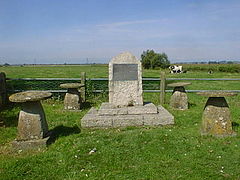Battle of Sedgemoor
| Battle of Sedgemoor | |||||||
|---|---|---|---|---|---|---|---|
| Part of the Monmouth Rebellion | |||||||
 Battle of Sedgemoor memorial |
|||||||
|
|||||||
| Belligerents | |||||||
| Royal army of James II |
|
||||||
| Commanders and leaders | |||||||
|
Louis de Duras, |
Lord Grey of Warke, Benjamin Hewling |
||||||
| Strength | |||||||
| 3,000 | 4,000 | ||||||
| Casualties and losses | |||||||
| 200 | 1,300 killed 320 executed 750 transported |
||||||
Louis de Duras,
John Churchill,
The Battle of Sedgemoor was fought on 6 July 1685 and took place at Westonzoyland near Bridgwater in Somerset, England.
It was the final battle of the Monmouth Rebellion and followed a series of skirmishes around south-west England between the forces of James Scott, 1st Duke of Monmouth, and troops loyal to James II. Victory went to the royalists and about 500 prisoners fell into their hands. Monmouth escaped from the battlefield but was later captured, taken to London and executed.
Many of Monmouth's supporters were tried during the Bloody Assizes. Many were transported abroad, while others were executed by drawing and quartering.
It was the final battle of the Monmouth Rebellion, by which the rebel James Scott, 1st Duke of Monmouth attempted to seize the English throne from his uncle James II of England. James II had succeeded to the throne on the death of his brother Charles II on 2 February 1685; James Scott was Charles' illegitimate son.
After Monmouth landed from the Netherlands at Lyme Regis in Dorset, there had been a series of marches and skirmishes throughout Dorset and Somerset. Eventually Monmouth's poorly equipped army was pushed back to the Somerset Levels, becoming hemmed in at Bridgwater on 3 July. He ordered his troops to fortify the town. The force was made up of around 3,500, mostly nonconformist, artisans and farmer workers armed with farm tools (such as pitchforks).
...
Wikipedia
